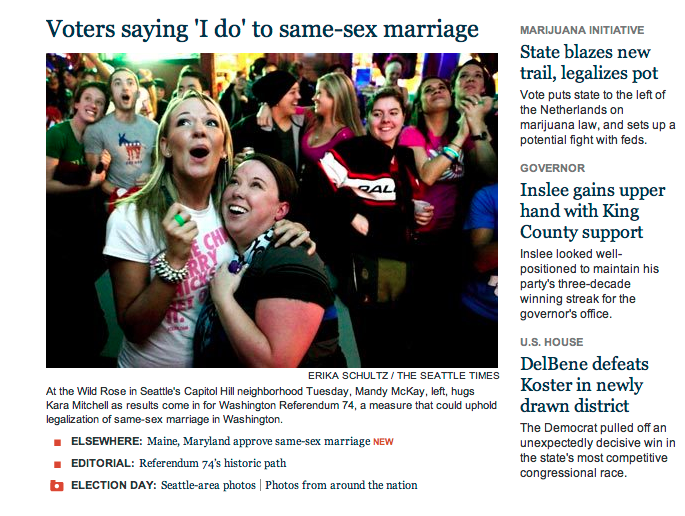Published at 19:17 on 29 November 2012
After covering the recent internet blackout in Syria, NPR All Things Considered had one of those basically useless wastes of breathable oxygen known as professional pundits come on to discuss the story. He was full of BS about how the USA so much better than that, and respects free speech so that anything of the sort would be “impossible” here.
Ignoring completely, of course, the inconvenient fact that the US ruling elite would like very much to have that capability, has sought it in the past, and almost certainly will seek it again. Oops!
Published at 21:20 on 14 November 2012

An astounding bit of progress, and the marijuana legalization is, for the first time in my memory, the United States (well, two states) actually starting to take the lead on something progressive for a change. (Same-sex marriage was the law of the land on other countries before the first state in the Union legalized it. Ditto for universal health care, which Obamacare really isn’t, given the cracks and gaps in that program, as much as it will dramatically expand coverage. But even The Netherlands never actually flat-out legalized cannabis use; they merely decided to stop enforcing the laws against possession of small amounts of it.)
But, there’s still plenty to do, particularly on global warming and ecological sustainability.
Published at 22:02 on 1 November 2012
Executive summary: Maybe. It’s impossible to say with any certainty. But that’s not the real issue to be concerned about.
Climate science is pretty unanimous that the Earth is warming and that human activity is responsible for that. But, the amount of warming so far has been a degree or two Fahrenheit. That’s far less than the natural variability that weather systems provide (deviations of ten degrees above or below norms are common).
It’s one of the things that makes life easier for deniers: “Look! There was a terrible, cold winter on the East Coast! That proves that the Earth cannot be getting warmer.” No, it doesn’t: add a degree of warming to a cold snap that sends temperatures twenty degrees below normal, and you have a cold snap that sends temperatures nineteen degrees below normal. Still a severe cold snap.
Might global warming have tipped things “over the edge” in this case, and caused a superstorm where none would have existed otherwise? It’s possible. Possible. Not certain. We can’t say. Weather is an extremely complex system and it’s not possible to predict specific outcomes well in advance.
Hurricanes have always happened. They happened well before humans started burning fossil fuels and dramatically increasing the amount of CO2 in the atmosphere.
But that’s irrelevant. There’s plenty of evidence that global warming will make storms like Sandy more common. Whatever Sandy’s root causes, Sandy offers a preview of what will become increasingly common in a warming world — and the more warming, the more common such storms will be.
That, and not any claim that Sandy must have been caused by global warming, is the real lesson to take from this week’s news.

